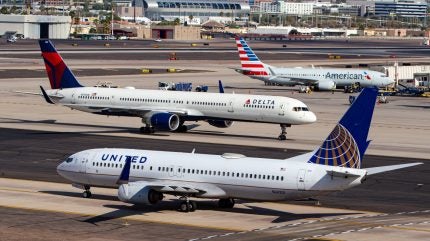
The US Department of Transportation (DOT) has launched a probe into the country’s four biggest airline loyalty programmes looking at the fairness and competitiveness of the schemes.
The department has ordered American, Delta, Southwest, and United to submit records and reports with detailed information on their programmes, which the DOT said have become a form of savings for many Americans and a “meaningful part” of the economy.
Transportation secretary Pete Buttigieg said: “These programs bring real value to consumers, with families often counting on airline rewards to fund a vacation or to pay for a trip to visit loved ones.
“But unlike a traditional savings account, these rewards are controlled by a company that can unilaterally change their value. Our goal is to ensure consumers are getting the value that was promised to them.”
According to the DOT, the review will examine the fairness, transparency, predictability and competitiveness of the selected rewards programmes, with the department highlighting its authority to take action against unfair or deceptive practices it may uncover.
Information requested in the probe includes reports on the devaluation of earned rewards, hidden and dynamic pricing practices, extra fees relating to the use or transfer of points, and a reduction in competition and choice from the merger of loyalty schemes.

US Tariffs are shifting - will you react or anticipate?
Don’t let policy changes catch you off guard. Stay proactive with real-time data and expert analysis.
By GlobalDataThe review has already seen some pushback from the industry with industry group Airlines for America (A4A) defending loyalty programmes as a “way carriers can say ‘thank you’ to travellers”.
The group said: “Millions of people enjoy being a part of various loyalty programmes, which allow them to accumulate rewards to apply toward travel or other benefits.
“US carriers are transparent about these programs, and policymakers should ensure that consumers can continue to be offered these important benefits.”
The probe is a step up of the government’s investigations into airline loyalty programmes after a public hearing on the schemes held by the DOT and the Consumer Financial Protection Bureau (CFPB) in May.
At the same time, the CFPB put out a report, revealing it had received 1,200 complaints about credit card reward schemes last year. Although it represented a relatively small number compared to the number of Americans using the schemes, it marked a 70% increase in complaints from pre-pandemic levels.
The investigation into loyalty schemes is also just one area of the government’s increased scrutiny of the industry, including legislation looking to limit hidden and “junk” fees for flight bookings that an A4A-lead lawsuit has managed to temporarily block in court.
The US Department of Justice has also taken a hardline stance against mergers and managed to stop JetBlue’s acquisition of Spirit earlier this year, though it recently chose not to take action against Alaska Air’s proposed merger with Hawaiian Airlines, with approval from the DOT now the only remaining hurdle for the deal.
Notably, United Airlines has since raised concerns to the DOT about the merger, citing its effect on the major airline’s deal with Hawaiian on shared loyalty programme rewards.



